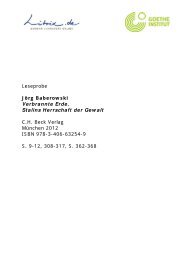Christa Wolf Ein Tag im Jahr 1960-2000 Luchterhand Verlag ...
Christa Wolf Ein Tag im Jahr 1960-2000 Luchterhand Verlag ...
Christa Wolf Ein Tag im Jahr 1960-2000 Luchterhand Verlag ...
You also want an ePaper? Increase the reach of your titles
YUMPU automatically turns print PDFs into web optimized ePapers that Google loves.
Translated extract from<br />
<strong>Christa</strong> <strong>Wolf</strong><br />
<strong>Ein</strong> <strong>Tag</strong> <strong>im</strong> <strong>Jahr</strong><br />
<strong>1960</strong>-<strong>2000</strong><br />
<strong>Luchterhand</strong> <strong>Verlag</strong><br />
München 2003<br />
ISBN 3-630-8749-6<br />
pp. 5-23<br />
<strong>Christa</strong> <strong>Wolf</strong><br />
One Day in the Year<br />
<strong>1960</strong>-<strong>2000</strong><br />
Translated by Isabel Cole<br />
© Litrix.de 2004
The Wonderful 27th of September<br />
I didn’t read a single newspaper.<br />
I didn’t stare after a single woman.<br />
I didn’t open the mailbox.<br />
I didn’t wish anyone a good day.<br />
I didn’t look in the mirror.<br />
I didn’t talk to anyone about old t<strong>im</strong>es or<br />
about new t<strong>im</strong>es.<br />
I didn’t examine myself.<br />
I didn’t write a single line.<br />
I didn’t start a single ball rolling.<br />
Thomas Brasch<br />
My Twenty-Seventh of September<br />
How does life come about? The question preoccupied me early on. Is life identical with the<br />
t<strong>im</strong>e that passes, inevitably yet mysteriously? As I write these words, t<strong>im</strong>e passes; at the same<br />
t<strong>im</strong>e a tiny fragment of my life takes form – and fades. Does life consist then of countless<br />
such microscopic t<strong>im</strong>e-fragments? Strange, though, that you can’t catch it in the act. It evades<br />
both the watching eye and the diligently jotting hand, and in the end – at the end, too, of a life<br />
phase – it has fitted itself together behind our backs according to our secret needs: richer,<br />
more significant, exciting, meaningful, story-filled. It reveals itself as more than the sum of<br />
the moments. More, too, than the sum of all the days. At some point, unbeknownst to us,<br />
these everydays turn into lived t<strong>im</strong>e. Into fate, at best or worst. At any rate, into a curriculum<br />
vitae.<br />
I was <strong>im</strong>mediately piqued by the Moscow newspaper Izvestia’s <strong>1960</strong> appeal to the<br />
writers of the world: Describe one day in this year, the 27 th of September, in as much detail as<br />
possible. It was a revival of the project “One Day in the World” which Max<strong>im</strong> Gorkii initiated<br />
in 1935 and which had not gone without response, but was not continued. – So I sat down and<br />
described my 27 th of September.<br />
2
So far, so good. But why did I go on to describe the 27 th of September, 1961? And all<br />
the 27 th s of September to come, to this day – forty-three years long, more than half my adult<br />
life by now? And why can’t I stop? I am not conscious of all the reasons, but there are a few I<br />
can name: first, my horror of forgetfulness, which, as I have seen, sweeps away mainly the<br />
everydays I so treasure. Where to? S<strong>im</strong>ply into forgetfulness. Fleetingness and futility as<br />
twins of forgetfulness: over and over again I was (and am) confronted with this unsettling<br />
phenomenon. I wanted to write in defiance of this inexorable loss of existence. One day in<br />
each year, at least, should serve as a steadfast pillar for memory – described purely,<br />
authentically, free from artistic intent, that is: left, surrendered to chance. I could not control<br />
what these chance days brought me, nor did I wish to; thus apparently banal days appear<br />
alongside “more interesting” ones; I could not avoid the mundane, could not seek, much less<br />
rig “significance”. With a certain feeling of excitement I began waiting to see what this day of<br />
the year, as I soon called it, would bring me in the coming year. These notes became a<br />
compulsory exercise, somet<strong>im</strong>es enjoyable, somet<strong>im</strong>es irksome. They also became an<br />
exercise to counter reality-blindness.<br />
It did prove more difficult to capture developments this way. All these separate daily<br />
logs can hardly be said to stand for the forty years from which they were lifted island-like.<br />
But I hoped that the findings which I gathered selectively, at regular intervals, might in t<strong>im</strong>e<br />
produce a kind of diagnosis: expression of my desire to get to the bottom of situations, people,<br />
but most of all myself. Often beginning that same day, usually continuing over the course of<br />
the next few days, I noted what I had experienced, thought, felt that day; memories,<br />
associations – but also the current events that held me captivated, political developments that<br />
affected me, the state of the country in which I lived and took part until 1989 and – what had<br />
not been foreseeable – the phenomena of the GDR’s collapse and the transition to another<br />
society, another state. Also reflected, of course, are my attitudes, somet<strong>im</strong>es changing<br />
suddenly, more often gradually, toward all these complex, complicated events: contentious,<br />
combative attempts to come to grips. In this sense these notes are more than mere material,<br />
they have also become evidence, by no means complete, of my development. The temptation<br />
to correct former misjudgments and unjust assessments from today’s point of view had to be<br />
resisted.<br />
These diary entries differ markedly from the rest of my diary, not only in structure but<br />
in content, and in their stronger thematic l<strong>im</strong>its and focus. But they were not intended for<br />
publication either – as were, from the outset, the prose pieces based on the course of a day:<br />
“June Afternoon”, “Accident”, “What Remains”, “Desert Journey” – evidence of my<br />
3
fascination with the narrative potential of almost any given day. On the contrary, it took a<br />
conscious decision to publish these notes in which the “I”, no artistic construct, defenselessly<br />
exhibits and surrenders itself – even to the uncomprehending and unsympathetic gaze.<br />
Why do this? My experience is: from a certain point on, a point that cannot be<br />
determined afterwards, you begin to see yourself historically, that is: <strong>im</strong>bedded in, bound to<br />
your t<strong>im</strong>e. You develop distance, increased objectivity toward yourself. Examining yourself<br />
critically, you learn to compare, becoming no more lenient, perhaps, but more fair. You see<br />
how much universality lies in the most personal things, and you believe that the reader’s need<br />
to judge and condemn can be joined by self-discovery and, ideally, self-perception.<br />
Subjectivity remains the most <strong>im</strong>portant criterion of the diary. This is something of a<br />
scandal in t<strong>im</strong>es when we deluged with objects and are ourselves objectified; even the barrage<br />
of seemingly subjective shameless disclosures with which the media molest us is nothing but<br />
a coolly calculated element of this commoditized world. I don’t know how we are to escape<br />
and counter this compulsive objectification, which infiltrates our most int<strong>im</strong>ate emotions, if<br />
not by developing and expressing our subjectivity, regardless of the effort it may cost us. The<br />
need to be known, with all our problematic traits, complete with mistakes and flaws, is at the<br />
root of all literature and is one of the motives that drives this book as well. We shall see<br />
whether the t<strong>im</strong>e has come for such a gamble.<br />
But the pivotal reason for publishing these notes is this: I believe they are a test<strong>im</strong>ony<br />
to their t<strong>im</strong>es. I see their publication as a kind of professional duty. I believe our recent history<br />
runs the risk of being reduced and laid down, even now, to easily manageable formulas.<br />
Perhaps test<strong>im</strong>ony such as this can do its part to keep in flux the opinions about what<br />
happened, help reexamine prejudices, dissolve rigidity, allow people to recognize their own<br />
experiences and gain more confidence in them, let others’ situations touch them more<br />
closely…<br />
I have held to the authenticity of the texts. Slight abridgements have been made. In<br />
certain cases passages had to be struck to protect the privacy of those concerned.<br />
April 2003<br />
4
Tuesday, September 27, <strong>1960</strong><br />
Halle an der Saale, Amselweg<br />
The first thing upon waking up is the thought: once again the day won’t go as planned.<br />
I’ll have take Tinka to the doctor about her hurt foot. Doors bang outside. The children are<br />
already out and about. Gerd is still asleep. His brow is damp, but his fever is gone. He seems<br />
to have gotten over his flu.<br />
The children’s room is astir. Tinka is reading a picture book to a filthy little doll: One<br />
girl wanted to warm her hands, one wanted to warm her mittens, one wanted to drink tea. But<br />
there wasn’t any coal. Too bad!<br />
She’ll turn four tomorrow. Annette worries whether we’ll be baking enough cake. She<br />
works it out for me: Tinka has invited eight children over for coffee. Overcoming a small<br />
fright, I write Annette’s teacher a note: Please let my daughter Annette go home at luncht<strong>im</strong>e<br />
tomorrow to celebrate her little sister’s birthday.<br />
While making sandwiches I try to remember how I spent the day before Tinka was<br />
born four years ago. It always dismays me how quickly and how much you forget when you<br />
don’t write everything down. On the other hand, it’s not feasible to hold onto everything:<br />
you’d have to stop living. – Four years ago it seems to have been warmer, and I was alone.<br />
That evening a friend came to spend the night with me. We sat together for a long t<strong>im</strong>e, it was<br />
our last int<strong>im</strong>ate conversation. She told me about her future husband for the first t<strong>im</strong>e …<br />
That night I phoned for an ambulance.<br />
Annette is ready at last. She’s a bit poky and untidy, the way I must have been as a<br />
child. Back then I would have refused to believe I would ever dress down my children the<br />
way my parents did me. Annette has mislaid her wallet. I scold with the words my mother<br />
would have used: We can’t toss money around like that, what on earth are you thinking?<br />
When she goes I take her head in my hands and give her a kiss. Take care! We wink at<br />
each other. Then downstairs she slams the front door with a loud bang.<br />
Tinka calls me. I reply <strong>im</strong>patiently, try sitting at my desk. Maybe I can get at least an<br />
hour of work in. At the top of her voice Tinka sings her doll a song the children are very fond<br />
of lately: “In the evening by moonshine, out into the town….”. The last verse goes like this:<br />
One evening in the gable<br />
They ate at a table.<br />
One evening at night<br />
The stork brought a child in flight<br />
5
When I’m there Tinka never fails to reassure me: she knows perfectly well that the<br />
stork couldn’t carry a baby, that would be cruelty to an<strong>im</strong>als. But it doesn’t matter when you<br />
sing it.<br />
She starts yelling for me again, so loud that I break into a trot and rush over to her.<br />
She’s lying in bed with her head buried in her arms.<br />
What are you screaming like that for?<br />
You weren’t coming, I had to scream.<br />
I said I was coming right away.<br />
Then it still takes forever forever never never never. She has discovered that words can<br />
rhyme. I unwrap the bandage from her cut foot. She screams like a stuck pig. Then she flicks<br />
the tears away with one finger. At the doctor’s it’ll hurt too.<br />
Are you going to scream like that at the doctor’s? The whole city’ll come running. –<br />
Then you’ll have to take off my bandage. – Yes, yes. – Can I have pudding soup for<br />
breakfast? – Yes, yes. – Make me some! – Yes, yes.<br />
The pain in her foot seems to ease up. While dressing she scratches the bottom of the<br />
table-top with her fingernails and splits her sides laughing. She wipes her nose with the tail of<br />
her shirt. Hey! I shout, who’s that blowing her nose on her shirt? She tosses her head back,<br />
laughs raucously: Blowing her nose on her shirt, poopy-shirt.<br />
Tomorrow’s my birthday, so we can start having some fun today, she says. But you<br />
forgot I can get dressed by myself already. – I didn’t forget, I just thought your foot hurts too<br />
badly. – She snakes her toes elaborately through the pants legs: You see, I’m much more<br />
careful about it than you. – There are tears once more, when the red shoe pinches. I slip one of<br />
Annette’s old house shoes onto the injured foot. She is delighted: Now I have Annette’s<br />
slipper on!<br />
When I carry her out of the bathroom her good foot bumps the wooden box by the<br />
door. Bomm! she calls out. That hit like a bomb! – How does she know how a bomb hits? The<br />
last t<strong>im</strong>e I heard a bomb detonate was more than sixteen years ago. Where does she know the<br />
word from?<br />
Gerd is reading Lenin’s letters to Gorkii, and we get started on our old discussion: art<br />
and revolution, politics and art, ideology and literature. The <strong>im</strong>possibility of congruence<br />
between the mental edifices of politicians and artists – even Marxist ones. The “own world”<br />
which Lenin grants Gorkii (and more than grants: takes for granted), for all <strong>im</strong>placability in<br />
philosophical questions. His consideration, his tact for all his severity. Two equal partners<br />
working together, rather than a confrontation between the all-knowing one and the one in<br />
6
need of instruction. Open, generous recognition of each other’s areas of authority… We get<br />
into the role of experience in writing and the responsibility you bear for the content of your<br />
experience: but are you free to acquire any experiences whatsoever, perhaps desirable from a<br />
social point of view, if you are unsuited for them by background and character structure? You<br />
can familiarize yourself with many things, of course. But experience them? – There’s a<br />
dispute about the plan for my new story. Gerd insists that the plan so far is too superficial and<br />
should be transformed into one appropriate to me. Or do I want to do a journalistic piece?<br />
Then go ahead and start writing. Slight disgruntlement on my part, unacknowledged as always<br />
when I really sense that “there’s truth to it”.<br />
Did I read this? An article by Lenin entitled “A Talented Little Book”, referring to a<br />
book by a “White Army soldier embittered almost to the point of mental derangement”: A<br />
Dozen Daggers in the Back of the Revolution. Lenin discusses it half-ironically, half-<br />
seriously, acknowledging its “expertise and sincerity” when the author describes what he<br />
knows, what he felt and lived through. Lenin s<strong>im</strong>ply assumes that the workers and peasants<br />
will draw the right conclusions from the plain, expert descriptions of the old bourgeois<br />
lifestyle, conclusions of which the author h<strong>im</strong>self is incapable, and he seems to grant the<br />
possibility of printing some of these stories. “Talent ought to be encouraged” – which again is<br />
irony, but also confidence. We speak of the prerequisites for confident behavior in a country<br />
where socialist society must develop under conditions like ours. Of the reasons and roots of<br />
provincialism in literature.<br />
We laugh when it occurs to us what we talk about endlessly at all hours of the day and<br />
night – like heroes of schematic books whom we’d criticize as <strong>im</strong>plausible.<br />
I take Tinka to the doctor. She talks and talks, to talk away her fear, perhaps. Now she<br />
demands an explanation of a mural (Why don’t you think it’s pretty? I think it has pretty<br />
colors!), now she wants to be carried in consideration for her sick foot, now she’s forgotten all<br />
her pain and balances on the stone borders of the front gardens.<br />
Our street leads toward a new apartment building that’s been under construction for<br />
months. A lift carries up barrows full of mortar sacks and transports empty barrows back<br />
down. Tinka wants to know exactly how it works. She has to content herself with an<br />
approx<strong>im</strong>ate explanation of the technology. Her new, unshakable belief that everything that<br />
exists is “good for something”, good for her. If I so often fear for the children, it’s mainly<br />
because this belief will inevitably be violated.<br />
As we go down the steps of the post office I squeeze her under my arm. – Not so fast,<br />
I’ll fall! – You won’t fall. – When I’m big and you’re small, I’ll run down the stairs that fast<br />
7
too. I’ll grow bigger than you. Then I’ll jump way up high. Say, can you jump over the<br />
house? No? But I can. Over the house and over a tree. Should I? – Go ahead! – I could real<br />
easy, but I don’t want to. – Oh, you don’t want to? – No. – Silence. After a while: But in the<br />
sun I’m big. – The sun is hazy, but it casts shadows. They’re long because the sun is still low.<br />
– Big all the way up to the clouds, says Tinka. I look up. Hazy little clouds float very high in<br />
the sky.<br />
A huge palaver in the waiting room. Three elderly women huddle together. One,<br />
speaking Silesian dialect, bought a blue cardigan yesterday for a hundred and thirteen marks.<br />
The incident is illuminated from all angles. The three of them carp in unison about the price.<br />
A young woman sitting across from them finally interrupts the uninformed discussion in a<br />
superior tone of voice. It emerges that she is a fabric saleswoman and that the cardigan isn’t<br />
an “<strong>im</strong>port” after all, as the Silesian was assured when she purchased it. She is indignant. The<br />
saleswoman holds forth on the advantages and disadvantages of wool and Wolcrylon.<br />
Wolcrylon is practical, she says, but if you want something nice and elegant, take wool. Good<br />
things always make a comeback, says the second of the three women, and I look pleadingly at<br />
Tinka, who is about to ask a no doubt inappropriate question. In the west a cardigan like that<br />
costs fifty marks, says the Silesian. – Well, explains the second, just do the conversion: one to<br />
three. Comes out to a hundred fifty marks too. – True enough.<br />
There seems to be no point to interfering with their conversions.<br />
I got the money from my daughter, says the Silesian. I couldn’t have done it with my<br />
hundred-twenty marks pension. – All three of them sigh. Then the woman next to her says:<br />
That’s always been my motto: s<strong>im</strong>ple but elegant. I eye her surreptitiously and can’t find the<br />
elegance in her. – She, unperturbed: This coat here. Bought it in 1927. Gabardine. Peacet<strong>im</strong>e<br />
goods. Indestructible. – I gaze at the coat, appalled. It is green, with a slight sheen to it, old-<br />
fashioned, otherwise there is nothing striking about it. A coat can’t be sinister. Tinka tugs at<br />
my sleeve, whispers: When is nineteen-hundred twenty-seven? – Thirty-three years ago, I say.<br />
– She uses an expression of her father’s: Was I in the works yet? – Not by a long shot, I say. I<br />
wasn’t in the works yet either. – Oh my goodness, says Tinka. – The Silesian, still brooding<br />
over her blue cardigan, consoles herself: At least I won’t freeze this winter.<br />
Now the third, a skinny woman who has said little so far, remarks with quiet triumph:<br />
I don’t need to worry about all that, thank God… – Mute inquiry from the others. Finally:<br />
You have relatives over there? – No. That is: yes. My daughter. But she just makes the<br />
arrangements. There’s a gentleman. I don’t even know h<strong>im</strong>, but he sends me what I need.<br />
8
Now he’s already made inquiries again to find out what I need for the winter. – Undisguised<br />
envy in the others’ eyes. Well – then! Can’t do much better than that these days!<br />
I’m silent, long since gave up reading. The receptionist calls all three of them out.<br />
Tinka is utterly still as the doctor prods the wound. She’s pale, her hand in mine grows<br />
damp. Did it hurt? asked the doctor. She makes her <strong>im</strong>penetrable face and shakes her head.<br />
She never cries in front of strangers. Outside, as we’re waiting for the dressing, she suddenly<br />
says: I’m glad it’s my birthday tomorrow!<br />
The sky has filled with clouds. We’re already looking forward to the lift. Tinka would<br />
have lingered there a long t<strong>im</strong>e if she hadn’t been in such a hurry to go to the potty. She turns<br />
reticent then. She’s preoccupied by the big black dog whose kennel we’re about to pass. At<br />
this point, as always, she tells me that this dog bit a woman in the finger once. It must have<br />
been years ago, if it’s even true, but the legend has left an indelible <strong>im</strong>pression on Tinka.<br />
Effect of stories!<br />
The mail waiting at home is disappointing, a vacuous card from a vacuous girl. But<br />
motorcycles stop in front of our house several t<strong>im</strong>es, couriers and telegram messengers, a<br />
substitute for the telephone. One brings the proofs of Gerd’s book on Louis Fürnberg.<br />
While lunch is cooking I read children’s compositions on “The Best Day of My<br />
Vacation”, submitted to the library at the railroad car plant. A nine-year-old girl writes: “It<br />
was great at our vacation camp. We had one day off. And we could go wherever we wanted. I<br />
went into the forest. And I saw a big deer and a little deer. They both lay there without<br />
moving. They were so tame that you could touch them. And I ran back fast and told the camp<br />
director. It wasn’t far to our camp. I told h<strong>im</strong> everything, and he came with me. He took the<br />
big deer with h<strong>im</strong> on a leash, and I got to carry the little deer. We had a little stall, and I put<br />
both of them in there and fed them every day. That was my best day.”<br />
I’m for giving the girl the first prize in the contest for her unlikely story.<br />
After lunch I go to the railroad car plant for the brigade’s party group meeting 1 : On the<br />
streetcar an old married couple searches their pockets frantically for the ten pfennigs they’re<br />
short for the tickets. They overspent themselves shopping. I offer the woman the ten pfennigs.<br />
Great consternation: Oh no, oh no, they can walk. Finally the man takes the coin, protesting<br />
all the while how embarrassed he feels. Something only we Germans are capable of, I think.<br />
1 In the GDR, brigades were production units within a plant. Not all of the workers in the brigades were<br />
necessarily party members. The “party group” refers to the group of party members within the given brigade.<br />
(Tr.)<br />
9
I haven’t been at the plant for several weeks. The hall is filled with half-finished cars.<br />
They seem to have overcome their production stoppage. But I’ve gotten my hopes up too<br />
soon.<br />
Willy doesn’t notice me at first. I watch h<strong>im</strong> working with his new device for<br />
preparing the pressure framework. He and J., his brigadier, have developed this s<strong>im</strong>ple but<br />
practical device and submitted it as a proposal for <strong>im</strong>provement. It cuts the t<strong>im</strong>e for this<br />
operation in half. In the plant people started whispering behind their backs, there was bad<br />
blood. Today I’m going to find out what’s really going on.<br />
Willy looks up. Well, dear heart? he says. He’s pleased. He has work to do. I take a<br />
seat in the brigade pen, which they themselves call the “open cattle shed”. Forty-five minutes<br />
left until finishing-t<strong>im</strong>e, but there are already three people sitting here and waiting for the t<strong>im</strong>e<br />
to pass. Still not enough work? Heads shake. The hall presented a deceptive picture – And<br />
what do you do the rest of the t<strong>im</strong>e? Occupational theory, they say. Ironyard, lumberyard,<br />
mending sleepers. – And the pay? That’s all right. We make the average. – They’re ill-<br />
tempered, resigned, angry – depending on their temperament. And the worst thing is: they no<br />
longer believe in a critical change for the better. Lothar says: By January we’ll be in the soup<br />
again, even if we bust a gut now in the last quarter to make the plan. The money gets thrown<br />
away on overt<strong>im</strong>e. Is that supposed to be profitable?<br />
His pay is all right, but he’s angry about the plant’s unprofitability. Can the plant<br />
director go to each brigade and explain what’s going on with the plant? He can’t. But<br />
someone has to explain it, in detail, and with the latest every week if possible. People who<br />
aren’t in the know start to act irresponsibly.<br />
Meanwhile the conversation has moved on to the plant party last Saturday. Jürgen tells<br />
how he just barely managed to get his wife back home in a plant omnibus after she drank too<br />
much and publicly boxed the ears of an <strong>im</strong>pudent colleague. I was so mad I hit the bottle<br />
again the next day, he says. He’s a bit worried his wife might have disgraced h<strong>im</strong>. Then the<br />
others start telling s<strong>im</strong>ilar incidents with their wives, matter-of-factly, without the<br />
extravagance of emotion – the way men talk about women. I think: the <strong>im</strong>pudent colleague<br />
probably deserved to get his ears boxed.<br />
Nine comrades meet in the conference room of the party leadership. They come in<br />
their work clothes, unwashed. There is one woman, with humorous, lively eyes; in the brigade<br />
I’ve seen her pound on the table before. Here she doesn’t say a thing.<br />
Making a long story short – let’s start, says Willy. He is the group organizer. I know<br />
what he intends to do today, and I watch in suspense and admiration as he makes ruthlessly<br />
10
for his goal. Lying in front of h<strong>im</strong> is his brigade’s public accounting. I’m familiar with it. But<br />
the comrades from the neighboring brigade, the partners in competition, sit rather sheepishly<br />
in front of the others’ twenty-three pages – they are rivals, after all, friendship<br />
notwithstanding. And when you’re familiar with the complicated history of the two brigades,<br />
which used to be one brigade… The plant’s star brigade, under the leadership of P., who sits<br />
across from Willy, continually mopping sweat and feeling duped.<br />
Rapidly and indistinctly Willy begins to read from the public accounting, a carefully<br />
chosen passage. The hand holding the page trembles slightly. For the uninitiated the<br />
atmosphere in the overheated room would tend more toward the soporific.<br />
No one takes quotes more seriously than Willy. He reads what Lenin said about<br />
stepping up work productivity. And how are we doing that? he interrupts h<strong>im</strong>self. A colleague<br />
says: before we started trying to become a Brigade of Socialist Labor, we always agreed with<br />
each other. Now there’s nothing but squabbling. Willy raises his voice. Now he’s coming to<br />
their proposal for <strong>im</strong>provement: the s<strong>im</strong>ple device I just saw in action. There was a huge to-<br />
do! he says, lowering the page, and looks straight at P. over his wire-r<strong>im</strong>med glasses: Savings<br />
of fifty percent! That’s unheard-of – for us, anyway! People questioned the realism of the<br />
proposal. Yes, you did to, P.! Don’t talk, it’s my turn. But the proposal is realistic, there’s no<br />
denying it. Sure, we got a bonus. Sure, we’re both going to earn handsomely the next few<br />
months. For me it comes out to a thousand marks, if you want to know. And what of it? Don’t<br />
material incentives hold for us comrades? Everything would have been fine if the two had<br />
shared their bonuses, plugged people’s mouths with a few bottles of beer. But that’s over and<br />
done with! Willy shouts. No more egalitarianism. And the next t<strong>im</strong>e the brigade has its<br />
evening out, we’ll buy you all a drink.<br />
egotist?<br />
And so the perfidious question emerged in the department: Are you a communist or an<br />
And that, Willy shouts, in an advanced stage of agitation, stumbling over his words,<br />
we all knew that. Or didn’t we? And what kind of a showing did we make as comrades? We<br />
didn’t. How could we! Couldn’t come to an agreement ourselves. Get more specific! calls<br />
someone from the neighboring brigade.<br />
Willy, louder and louder: Yes sir! As specific as you like! In the union leadership the<br />
two of us are proposed as activists. Who speaks against it? Comrade P.! In the party<br />
leadership they want to display our pictures along the “Street of the Best” on the Day of the<br />
Republic. Who advises against it? Comrade P.! Specific enough?<br />
11
Could I maybe get to say something now, P. demands. Please, says Willy. Just one<br />
more thing: It’s about the issue at hand, not whether I don’t like your looks or you don’t like<br />
mine. Everyone here at the table remembers P.’s remark from the days when Willy, with his<br />
“deteriorating cadre development”, was new to his brigade: H<strong>im</strong> or me, that’s the question<br />
here. One brigade isn’t big enough for the two of us. – On May 1 st P.’s picture still hung on<br />
the “Street of the Best”. Even to talk like this today, both of them must have forgotten a good<br />
deal and thought things they would never admit to themselves. One needn’t expect the<br />
conflict to come to a head and be “had out” according to the rules of classical drama. It’s<br />
already a lot for P. to admit: Your proposal was realistic. It’s right that you’re getting the<br />
bonus. – That exhausts his supply of self-denial. He evades the issue, dredges up an old story<br />
and hashes it out at length. He can’t s<strong>im</strong>ply admit defeat. There’s a give and take between the<br />
two brigades, the tension fizzles out, Willy has to come down a peg too, which is none too<br />
easy for h<strong>im</strong>.<br />
His brigade’s accounting is still lying in front of h<strong>im</strong>. A week from now P.’s people<br />
are supposed to be at the same stage. Suddenly the thought of the work frightens them. Willy<br />
treats h<strong>im</strong>self to this little triumph, as everyone can see. But enough is enough, they have to<br />
come to an agreement. They discuss who should help P.. If you want me, crank that I am…<br />
says Willy. – Old fool! P. retorts.<br />
Someone hits on the idea of inviting the wives to the brigade’s accounting, that’s the<br />
thing these days. No one can contradict openly, but it’s clear that the suggestion lacks fiery<br />
proponents. The women all have their hands full with the children, says one, especially after<br />
work… Günter R. is glad: You can only bring along your wife if you have one.<br />
Well, and you? Willy snaps at h<strong>im</strong>. I suppose you don’t have one? – No, says Günter.<br />
Not anymore. – What’s up with your marriage anyway? Don’t let me down because of a thing<br />
like that! Willy threatens. Günter is the youngest at the table. He gestures dismissively, but<br />
he’s gone bright red: It’s nothing. Don’t even mention it!<br />
Later P. tells me: Günter was sent to G. for a few weeks’ socialist support at the sister<br />
plant, and when he arrives home unannounced one day, the foreman comes strolling out of his<br />
bedroom. Of course he went straight to court the next day. And there’s no hope of patching<br />
things up…<br />
Gradually the mood turns cheerful. Jokes are cracked. When I cla<strong>im</strong> that none of them<br />
are interested in culture, they protest. The invitations for the public accounting are passed<br />
around, white folding cards with the word “Invitation” printed in ornate gold letters. That’s<br />
just about fancy enough for them. They want to invite all sorts of guests, “set an example”, as<br />
12
Willy says. Now he lets the meeting slide, hardly tense at all any more, looking quite happy.<br />
He winks at me and grins. Pretty slick, I say to h<strong>im</strong> later. Have to be, gal, he says. Never get<br />
anywhere otherwise.<br />
I hurry home, keyed up, my thoughts in a turmoil. All over again I hear what they say,<br />
plus what they don’t say, what their looks don’t even reveal. Who could possibly fathom this<br />
almost <strong>im</strong>penetrable web of motives and counter-motives, actions and counter-actions… To<br />
make big the life of people seemingly condemned to small steps….<br />
This t<strong>im</strong>e of year it’s already cold by evening. I buy what I need to bake the cake and<br />
pick up some birthday flowers. In the garden the dahlias and asters are already withering. I<br />
think of the enormous bouquet of roses on my bedside table in the hospital four years ago. I<br />
think of the doctor I heard saying: A girl. But she has one already. Oh well, I’m sure she<br />
won’t mind… His relief when I had a name already. The nurse who informed me how<br />
unwelcome girls still are somet<strong>im</strong>es, and all the things you see, especially with the fathers. If<br />
it’s a girl again they just don’t come, believe it or not. That’s why we’re not allowed to say<br />
what it is on the phone, a boy or a girl.<br />
Everyone wants to help bake the cake. The children are constantly underfoot. Finally I<br />
put on a fairytale record in their room: “Peter and the <strong>Wolf</strong>”. Afterwards they lick the mixing<br />
bowls until I take them away. Annette tells about her day at school: We learned a new song,<br />
but I don’t like it much. Republic rhymes with vic-tory – how do you like that? I think it’s<br />
boring. We have a new Russian teacher. She was surprised how many words we know<br />
already. But do you think she told us her name? Nothing doing. And we all had to write down<br />
all our names for her on a seating chart. I don’t think she thinks anything of it. – They mill<br />
around restlessly for a long t<strong>im</strong>e, unwilling to accept the fact that you have to sleep even the<br />
night before a birthday.<br />
In the oven the cake rises beyond all bounds. Now that it’s quiet I seem to hear it<br />
rising. The pans were too full. The cake rises and rises and drips in the oven and fills the<br />
entire apartment with a burned smell. When I take out the cake one side is black, I’m mad and<br />
can’t find anyone to blame but myself, and then Gerd comes and calls the cake “rather black”,<br />
and I tell h<strong>im</strong> indignantly that it’s because of the bad oven and the pans being too full and the<br />
gas too high. Oh well, he says, retreating.<br />
Later we listen to Antonin Dvoraks’s Violin Sonata op. 100, which Fürnberg wrote a<br />
poem about. Sweet, pristine music. My anger dissolves. We both realize s<strong>im</strong>ultaneously that<br />
we smell of burned cake, and we start to laugh.<br />
13
I still have writing to do, but everything bothers me: the radio, the television next door,<br />
the thought of the birthday hubbub tomorrow and of this tattered day on which I got nothing<br />
done. Listlessly I set the birthday table, arrange the candle wreath. Gerd leafs through some<br />
book or other, pronounces it “well-written”. For some reason that bothers me too.<br />
I look through the beginnings of the manuscripts that lie piled up on my desk. I’m<br />
galled by the lengthiness of the process called writing. A few faces do stand out from the<br />
s<strong>im</strong>ple brigade plot, people I know better, people I have linked together in a story which, I<br />
clearly realize, is still much too s<strong>im</strong>ple-minded. A country girl who comes to a big city for the<br />
first t<strong>im</strong>e in her life, to study here. Before that she does training at a plant, in a difficult<br />
brigade. Her friend is a chemist, he doesn’t get her in the end. The third is a young foreman<br />
sent to this brigade on probation after making a mistake… It’s odd how the banality of these<br />
banal incidents, “taken from life”, is heightened beyond endurance on the pages of a<br />
manuscript. I know that the real work will not begin until I find the “overarching idea” that<br />
makes the story tellable, and worth telling. But it can only be found – if at all, which I<br />
seriously doubt this evening – in this long process of preparatory work whose futility is clear<br />
to me.<br />
I know that neither the pages already lying nor the words I write today will remain –<br />
not a letter of them. I write, and then I cross it out again: As always Rita was wrenched from<br />
sleep in a flash and was awake without the memory of a dream. Only there had to have been a<br />
face. She wanted to hold onto it, it faded. Robert lay beside her.<br />
Before falling asleep I think: life consists of days like this one. Points which in the<br />
end, if you’re lucky, are connected by a line. That instead they could fall apart into a senseless<br />
accumulation of past t<strong>im</strong>e, that only an ongoing unwavering effort gives meaning to the little<br />
t<strong>im</strong>e units in which we live…<br />
I just manage to observe the first transitions into the <strong>im</strong>ages before falling asleep, a<br />
road appears, leading to the landscape I know so well without ever having seen it: the hill<br />
with the old tree, the slope falling gently to a stream, meadows, and on the horizon the forest.<br />
You can never really experience the moments before falling asleep – you would wake up<br />
otherwise – and I will always regret that.<br />
14



![PDF anzeigen [65 KB]](https://img.yumpu.com/21718989/1/184x260/pdf-anzeigen-65-kb.jpg?quality=85)


![show PDF [5522 KB]](https://img.yumpu.com/21308533/1/184x260/show-pdf-5522-kb.jpg?quality=85)
![PDF anzeigen [36 KB]](https://img.yumpu.com/21240334/1/184x260/pdf-anzeigen-36-kb.jpg?quality=85)

![Mostrar PDF [68 KB]](https://img.yumpu.com/14286441/1/184x260/mostrar-pdf-68-kb.jpg?quality=85)






